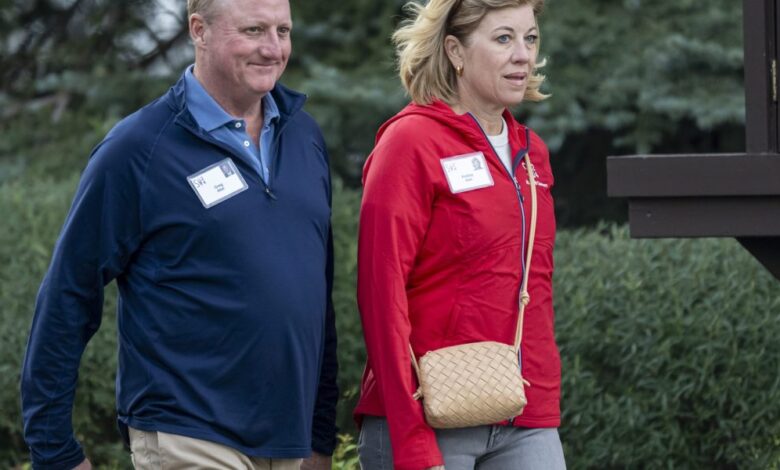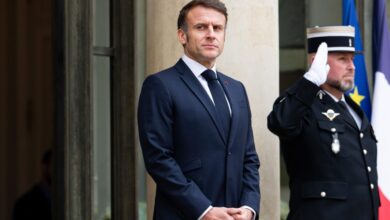Buffett hands his successor a giant cash pile and many questions


Warren Buffett picked the final minute of his 60th shareholder meeting to drop a long-awaited announcement that was still completely surprising for his fans, most of his board and even his successor.
Buffett, the 94-year-old architect and face of Berkshire Hathaway Inc., announced that the gathering would be his last as head of the company he built from humble beginnings into one of the world’s most valuable enterprises. A few feet away, Greg Abel, the energy executive long seen as Omaha’s crown prince, wasn’t even aware his time had come.
Buffett will hand Abel the keys to a $1.2 trillion behemoth, commanding a portfolio of stocks such as Apple Inc. and American Express Co. on top of a collection of insurance, energy, railroad and consumer businesses that regularly churn out $10 billion a quarter in operating profit. The 62-year-old will also inherit a plethora of questions, starting with what he’ll do with Berkshire’s almost $350 billion cash pile after Buffett largely sat out a volatile last few years in the markets.
Shareholders will want to know how Abel will change the company’s idiosyncratic and lean C-suite, whether he’ll bring a different risk tolerance or industry preferences, and if the firm will remain the first call for companies in need of a big check and a vote of confidence. They’ll even wonder about the future of the annual meeting itself, the so-called Woodstock for Capitalists that drew acolytes from across the globe based on the wisdom and wit of Buffett and his late business partner Charlie Munger.
“People love Warren because he has a certain magic,” said Alice Schroeder, who wrote The Snowball: Warren Buffett and the Business of Life, the billionaire’s biography that’s considered a must-read for his admirers and helped propel his fame. “Recreating it is almost impossible.”
While few expect Abel to match Buffett’s Main Street celebrity and love of the limelight, the departure of the longest-serving CEO in the S&P 500 also opens deeper questions about what kind of pressures might someday come to bear in his absence.
Berkshire doesn’t pay a dividend and only recently started buying back stock, with Buffett relying on his track record to show that he could compound shareholders’ money at a better rate than broader markets would offer.
And Berkshire has reached such heft — with nearly 400,000 employees — and has so many disparate businesses that some observers have debated over the years whether it might get broken up after Buffett leaves.
Abel has maintained that he’ll follow the principles that Buffett has laid out in investing and managing risk. And Buffett has said he will remain a major shareholder.
One thing “investors are going to have to muddle over is the notion of: Does Berkshire Hathaway stock still deserve the Buffett premium when Buffett is no longer there?” said Cathy Seifert, an analyst for CFRA Research. “There could be a laundry list that some institutional investors have that include the payment of a cash dividend, and a more regular capital allocation program.”
Energy Dealmaker
Abel joined Berkshire Hathaway by way of an acquisition.
The Canadian-born executive who started his career as an accountant for Pricewaterhousecoopers later joined geothermal power company CalEnergy in 1992 as a controller.
David Sokol, CalEnergy’s CEO at the time, had ambitions of building the business through acquisitions and saw talent in Abel. In 1996, he sent Abel to run an electric utility in the UK that the company had purchased. CalEnergy struck a deal in 1998 to buy MidAmerican Energy, a utility in Iowa, and adopted its name.
Berkshire took a controlling stake shortly after, enabling the company to go on an acquisition spree, snatching up pipelines in the wake of Enron Corp.’s bankruptcy and electric utilities in the northwestern US.
In 2008, Sokol took on a broader role at Berkshire, and Abel was named CEO of MidAmerican. Buffett had reservations about whether he could find and negotiate deals, according to Sokol.
“I knew the answer to that, because he had participated in every acquisition we had made and he had handled a couple of them virtually on his own,” Sokol said in a 2014 interview. “I think Warren and some of our board members weren’t sure just because they hadn’t experienced it with him.”
Within months, Abel demonstrated his chops. In September 2008, MidAmerican agreed to pay about $4.7 billion to buy Constellation Energy Group Inc. after the Baltimore-based power company lost half its market value in a week. Berkshire netted more than $1 billion from a breakup fee and profit on its investment after Constellation turned to another suitor.
Abel’s other deals proved longer-lasting. In 2013, he purchased Nevada’s largest electric utility, NV Energy, and the following year Abel agreed to buy an electric transmission company in his native Alberta. MidAmerican’s name was later changed to Berkshire Hathaway Energy in 2014 to align the brand more closely with the reputation and values Buffett stood for during his decades-long career.
The expansion resulted in the creation of a sprawling US utility company, keeping the lights on in states like Iowa and Nevada and operating natural gas pipelines that run some 14,200 miles across the country, from Texas to Michigan.
This helped him gain the reputation of a skilled utility executive, and eventually, to earn Buffett’s trust. In 2018, he was promoted to vice-chairman, expanding his oversight to all of Berkshire Hathaway’s non-insurance operations, a remit that spans railroad operator BNSF to iconic sweets maker See’s Candies.
He was announced as the successor-in-waiting in 2021, after Munger let slip at Berkshire’s annual meeting that Abel would keep the conglomerate’s culture intact after Buffett steps down.
Since his promotion, operating earnings — excluding insurance a few other items — have swelled about 27% to almost $22 billion last year.
Now, what remains to be seen is his investment acumen. Todd Combs and Ted Weschler were hired in 2010 and 2011, respectively, to help manage Berkshire’s stock and bond holdings. Combs has since taken oversight of insurance unit Geico. Both have advised Buffett on potential takeovers and may to do the same for Abel.
“Greg is the business leader, he is not in charge of investing,” Schroeder said. “That is going to be one of his and the board’s biggest challenges.”
Handed a cash hoard of nearly $350 billion to invest, the executive doesn’t have any stock-picking track record. During the meeting Saturday, he was asked about his capital allocation strategy when he takes over. He called the cash pile an “enormous asset” and pledged continuity. But his approach to the answer wasn’t what Berkshire regulars have grown accustomed to.
“He struggled on that question,” said Cole Smead, a shareholder of Berkshire Hathaway.
“I thought like Charlie and Warren, he would look back at a prior time in his life and tell a story about something he had experienced in investing,” Smead said. “He didn’t.”
This story was originally featured on Fortune.com
https://fortune.com/img-assets/wp-content/uploads/2025/05/GettyImages-2160866223-e1746389544280.jpg?resize=1200,600
2025-05-04 20:30:21





